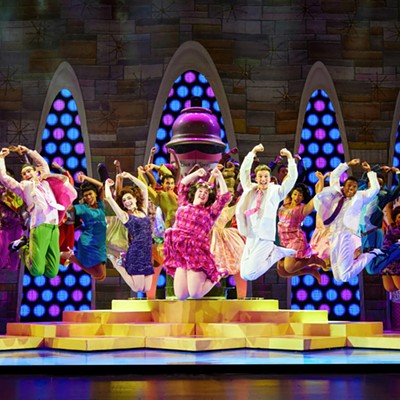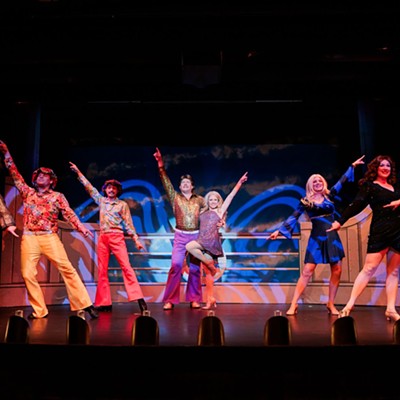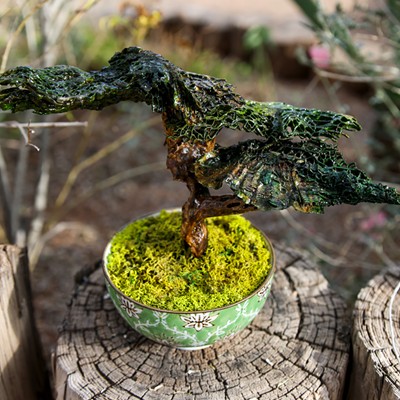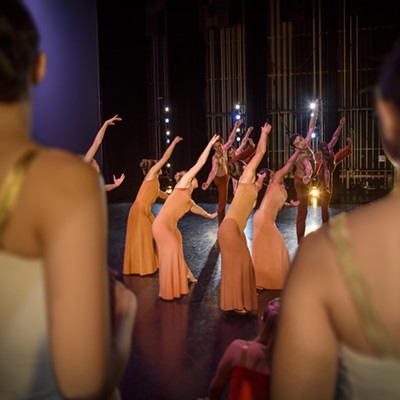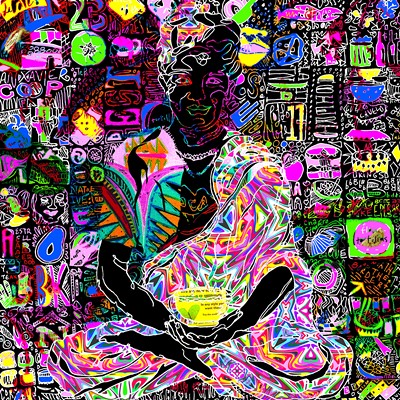"It's complicated."
Both characters in Sharr White's rich little play, Annapurna, make that pronouncement at different moments in their awkward, stumbling dance in the current Live Theatre Workshop's production directed by Sabian Trout. White's story of regret and pride and unfinished business and the helplessly lasting nature of love spills both comically and painfully across the stage.
First we are introduced to Emma (Rhonda Hallquist) and Ulysses (Keith Wick) in a visually bold but blunted way. The lights come up revealing a woman with a suitcase in her hand and a man in torn undershorts and apron, holding a large spatula, shirtless with a large bandage on his chest and an oxygen tank in a backpack. They stare at each other. This image lasts for just a moment, and then there's a blackout. The lights come up again, and the man says, staring at the women, "Holy Crap!" The lights blackout again. It's a tease that has earned our curiosity when at last the lights stay on and the story begins in earnest.
Underlying the comic nature of this image and the characters' brief exchange, as we might expect, is a sordid history. Twenty years earlier, Emma had taken their 5-year-old son and left in the middle of the night with no explanation to Ulysses, in person or in writing. They've since had no contact. Uly is put off by Emma's sudden intrusion after all these years especially as it appears that she is prepared to stay awhile. Awkwardly, and with a bit of Uly's wicked wit, they begin to sort out what has transpired, and why.
As he demands an explanation for why she departed with no word and why he never heard from his son, although he wrote him letters for years, she questions him about what happened the night that she fled. He doesn't remember, he insists. He makes no attempt to hide his anger as he continues to press her to explain why she behaved as she has, and she keeps asking him if he has any memory of that night. This is a much-repeated exchange, so we know there is something meaty here, but it takes some time to get where we're going.
In the meantime, we learn several things. Uly is a drunk. Or he was. A full-blown, drink all day, black-out drunk. A respected poet, it cost him his job as a college instructor. He's moved to a speck of a mountain town in Colorado (which he calls the "ass crack of the Rockies") where he lives alone in a broken down, dreary mobile home. He has emphysema and cancer, a result of smoking numerous packs a day when he gave up drinking. He has refused treatment; he is impoverished. And he lives with the agony of Emma's unexplained departure and what he assumes is her not allowing their son access to the letters he has written. He also lives, in a more subterranean way, with the fear of what might have happened that night when Emma and son disappeared.
Emma was an editor and mother who remarried after leaving Uly and has left again a husband without a word, although by the looks of the bruises on her arms, she was justifiably escaping a physically abusive one. Having heard about Uly's illness, and with her son finally getting access to Uly's letters, which he thinks she hid from him intentionally, she has dropped in to prepare for Sam finding his dad. It also seems that it is Emma's intention to care for Uly in his final days of life.
Yes, it's complicated.
Hallquist and Wick are fine actors and they take on the history, the surprising and baffling present and an uncertain next step with a courage and intimacy that makes them wholly sympathetic. White's play is heavy-handed in numerous ways: the foreshadowing of secrets to be revealed; the metaphorical references to a sort of reverse Homer's Odyssey; and climbing mountains. Annapurna is the name of one of the ten tallest peaks in the world, but it's one of the most dangerous to climb because of its steep face. Uly tells Emma about the first pair of climbers to reach the top, Maurice Herzog and Louis Lachenal in 1950, each losing all their toes and one losing all his fingers after he dropped his gloves into a chasm, watching helplessly as they fell. Annapurna is also the title of Uly's magnum opus, a poem he's been working on for years. White has given the actors quite a challenge, because although the metaphors may be ham-fisted, there is a ton of subtext these actors must scramble for to tell their story with conviction and heart.
In most ways, they succeed. But the piece as a whole seems lacking somehow. With the repeated foreshadowing, the event at the center of that foreshadowing is almost unsurprising when it happens, almost blunting its horror at the apex of their reunion. The rhythm is not quite right. Although our characters have had a chance to drop the loads they've been carrying for so long, there's not quite the catharsis that seems intended. Perhaps that's the playwright's fault; perhaps it's this production's arc that doesn't quite satisfy; or maybe this was an off night. But in the aftermath, we don't feel that we've quite arrived, dramatically speaking. Certainly, we don't expect ends to be tied up neatly, but we are not even certain that we have reached the end of the play when it happens.
Still, the actors win our hearts as their characters slog through ugly, painful memories and wonder how or if or where they might go forward. And playwright White has clothed the story in enough humor and lightheartedness—and the actors know very well how to access this humor—that their story never wallows in hopelessness nor collapses with angst. It's funny, sometimes sweet and always heartbreaking. The actors embody a very human story, and that means, it's complicated. ■

